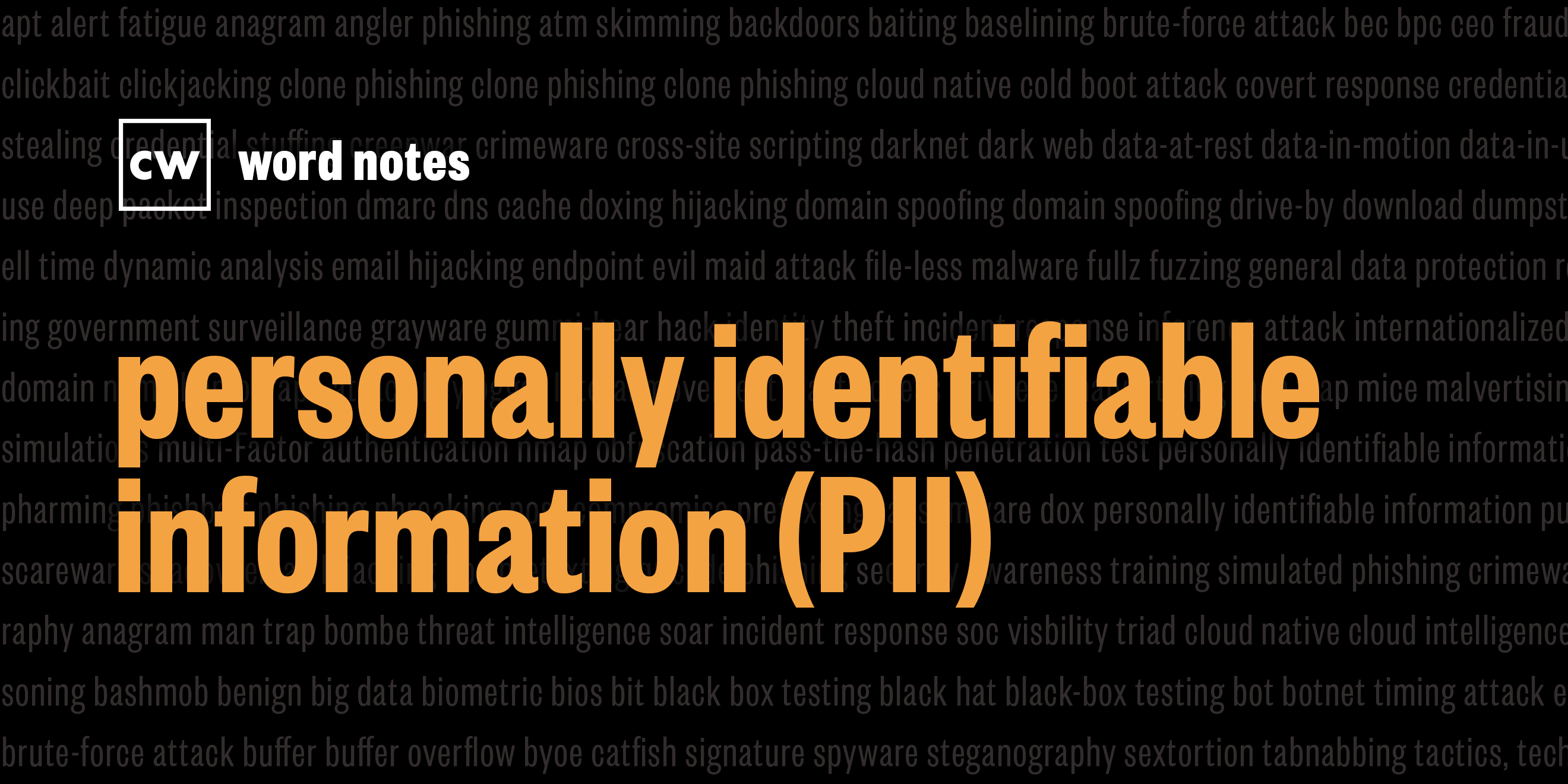
personally identifiable information (PII) (noun)
Rick Howard: The word is PII.
Rick Howard: Spelled: P for personally, I for identifiable, and I for information.
Rick Howard: Definition: A term of legal art that defines the types of data and circumstances that permits a third party to directly or indirectly identify an individual with collected data.
Rick Howard: Example sentence: Regulators understand that there is a growing demand among consumers to know all the PII that companies have about them backed up with the right to view and possibly correct this data.
Rick Howard: Origin and context: The idea of privacy in terms of legal considerations has been around since the late 19th century. According to Paul Schwartz and Daniel Solove from the University of California Berkeley School of Law, in 1890, two lawyers, Samuel Warren and Louis Brandeis, wrote the original paper that framed privacy in terms of European philosophy and said that every person deserves protection against certain kinds of harms as a consequence of being human. For digital privacy, the world didn't get a legal definition of PII until 1974. The United States or US passed the Family Educational Rights and Privacy Act, or FERPA. But the law focused on educational records and not a precise definition of what makes up PII.
Rick Howard: In 1984, the US passed the Cable Communications Policy Act that not only refers to PII, but makes it the trigger for the applicability of the law. It prohibits a cable operator from collecting PII concerning any individual subscriber without consent. It didn't prohibit the collection of aggregate information though. That means the cable operators could collect PII for statistical purposes. By 1996, the US passed the Health Insurance Portability and Accountability Act and defined precisely the data elements within PII: full name, date of birth, social security number, et cetera, about 21 elements in total, plus other elements if combined in the right way, like first name, place of birth, height and weight, et cetera.
Rick Howard: Fast forward to 2016, the European Union or EU passed the General Data Protection Regulation, or GDPR. According to RSI Security in March of 2020, the GDPR regulation swaps out the term PII for the preferred phrase "data protection," since PII is a US-created term of art. In doing so though, the EU greatly expanded the common notion of what data elements make up personal information. The law states that any information that relates to a specific individual, whether that data is private, public or professional in nature, is protected under GDPR. It also gave power to the individual by authorizing deletion requests, error correction, and request for copies. Organizations that failed to comply with these individual requests are subject to heavy fines.
Rick Howard: In 2018, the US state of California passed the California Consumer Privacy Act, or CCPA, that is similar in scope to GDPR. As of 2020, according to the international lawyers network, five other states are trying to pass similar GDPR legislation, Washington state, Nebraska, Virginia, Florida, and New York.
Rick Howard: Nerd reference: On the American TV show, "Parks and Recreation," Ron, played by Nick Offerman, calls April, played by Aubrey Plaza, into his office to ask how a website could possibly know his name.
Nick Offerman: Listen, I was trying to buy this handcrafted mahogany wood model of B-25 Mitchell Panchito aircraft.
Aubrey Plaza: Aw, for me?
Nick Offerman: Don't sass, me. And I went to this website and this ad popped up that said, "Hey, Ron Swanson, check out this great offer."
Aubrey Plaza: What's your question?
Nick Offerman: My question is, what the hell?
Aubrey Plaza: Like, how do they know who you are? Okay. Um, there are these things called cookies where like, if you go to a site and buy something, it'll remember you and then create ads for other stuff you might want to buy.
Nick Offerman: So it learns information about me? Seems like an invasion of privacy.
Aubrey Plaza: Dude, if you think that's bad, go to Google Earth and type in your address.
Rick Howard: That noise you hear at the end is Ron marching his brand new computer down to the dumpster.
Rick Howard: Word Notes is written by Nyla Gennaoui. Executive produced by Peter Kilpe, and edited by John Petrik and me, Rick Howard. The mix, sound design, and original music have all been crafted by the ridiculously talented Elliott Peltzman. And thanks for listening.

